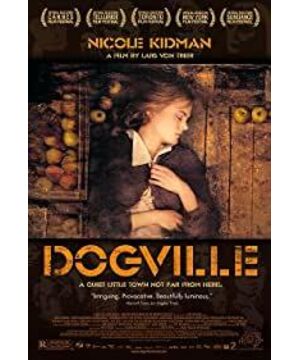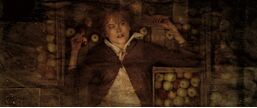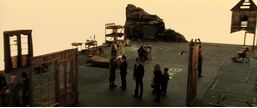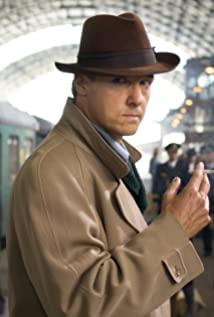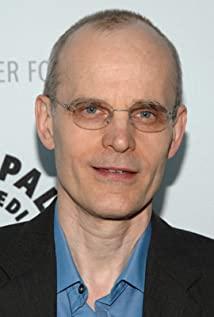Lars von Trier is one of my three favorite directors. His greatest strength is that each film can boldly explore and use different, diverse and novel audio-visual languages and expressions, and use a formalistic style to show the dark side and complexity of human nature. "Euro Express" uses color and black and white alternately, with magical overlays and hypnotic narration, to vividly portray the brutality of the war and the moral dilemma of the Germans after the war; "Breaking the Waves" and "Idiot" try to follow Gemma 95" required filming (although the former had no Dogme number, but complied with most of the precepts in the "Oath of Purity"), but it was quite a cocoon, and then this code was basically abandoned; "Dancer in the Darkness" With the gloomy and out-of-focus hand-held photography, it presents a brutal and shocking sense of reality, which forms a sharp contrast with the interspersed bright and brilliant dream song and dance scenes, which innovates the form of music and dance; "The Antichrist" pays tribute to Tarkovsky, However, it shows the poetry of killing and destruction in a deviant way; "Melancholia" starts with high-speed slow motion, and the whole process is hand-held, showing the inner world of negativity and despair; "Female Addict" has a gorgeous narrative, each chapter is matched with different frames, The color tone and photographic style perfectly integrate the shocking theme of "Xia Liba people" with the literary philosophy, mathematics and music of the bright spring and white snow. "Dogtown" is a very high-quality film. After its release in Cannes in 2003, it received rave reviews and an average media score of 3. 1. Became the champion of the current field magazine, but in the end there was no harvest, which is really a bit wrong. The main reason was the strong opposition of one of the jury members, Jiang Wen, but his criticism of the film was full of jealousy. There was hardly a word on the point. "Dancer in the Darkness" is the resentment of missing the Palme d'Or. The use of the stage play format is the biggest focus of controversy in this film. This format does reduce the viewing pleasure a lot, especially for the audience who are used to the audio-visual bombardment of sensory entertainment, but this is also in line with Brecht's proposal. The alienation effect (the script was also inspired by Brecht). The minimalist stage setting and lines also allow viewers to focus on the psychological changes, plot and ideological content of the characters themselves, which is more in line with the film's characteristics as a microcosm of human nature, a thought experiment, and a social fable. In addition, the stage-style setting also makes the heroine's impact on rape a lot higher. The villagers in the transparent house always remind people of indifferent spectators/accomplices. The unobstructed and pervasive perspective also further brings the audience's perspective closer. to God. There is basically no soundtrack in the whole film, only the last chapter and "National Day Singing" time exception. "Young Americans," a multi-played final chapter by David Bowie, is an almost blatant mockery of Americans. On July 4, the townspeople sang "America the "Beautiful" is the turning point when the townspeople tear off the mask of hypocrisy and reveal their evil face. In other respects, the "God's Perspective" of high-angle aerial shots frequently appears, and John Hurt's low and deep narration runs throughout. It seems that everything is for the audience to immerse themselves in the plot as calm and objective judges, but we are not gods, and we may unknowingly fall into the arrogance criticized by the film, occupy the moral high ground, and examine Dogtown with a sense of moral superiority. Resident and Grace. The most obvious metaphor in the film points to Christianity. The heroine Grace's name means "(God's) grace, grace", and her own thoughts and actions are also similar to Jesus, and her experience after arriving in the town is consistent with the crucifixion of Jesus. The destruction of the seven ceramic dolls represents the failure of Grace's efforts to save the townspeople with kindness and tolerance. The number 7 is also a number that appears frequently in the Bible, implying perfection and the sacred number (Yahweh created the world in 7 days, "Revelation" 7 churches, 7 seals, 7 plagues, 7 deadly sins, etc.). The only dog in the town who survived was named Moses, which is also intriguing. The ending of the film is reminiscent of the story of God destroying the city of Sodom (Gomorrah). Another originality lies in the children's names - Athena, Pandora, Achilles, Olympia, all characters in Greek mythology, which implicitly show the Christian logic and classical logic (ancient Greco-Roman civilization). Conflict and collision. The ideological connotation of the film is too rich. Due to my limited time, energy and IQ, I do not intend to discuss other content here. A simple and general (and possibly out-of-context) summary, this film not only exposes the evil aspects of desire, greed, selfishness, arrogance (focus on discussion), hypocrisy, etc. The contradiction between the Christian spirit of justice and absolute forgiveness, the contradiction in the internal logic of Christianity, the concomitant relationship between arrogance and power, the unclear moral boundary between good and evil, and the reflection on the simple democracy that brings mob dictatorship, etc. The dozens of photos at the end of the film are shocking. No matter whether you are poor or rich, regardless of ethnicity or region, the evil thoughts and acts in "Dog Town" are all over human society. The film asks us one question after another, torturing our conscience and soul: what is the way out for human civilization? Absolute tolerance cannot eliminate the ugliness, and even encourages the spread of the evil, but will the punishment of violence against violence surely eradicate the evil lurking in the hearts of everyone? Are we qualified to judge others? How to avoid standing on the moral high ground and condescending arrogance... [Copyright, reprinting is prohibited! 】[Copyright, reprinting is prohibited! 】[Copyright, reprinting is prohibited! 】
For more movie promotions, wonderful comments and related sharing, please pay attention to the public account: Ice Red Deep Blue Movie
View more about Dogville reviews


